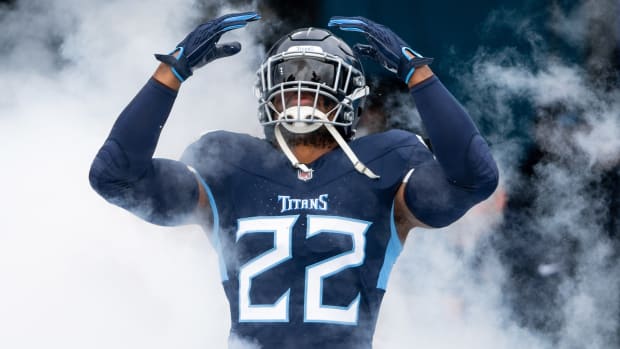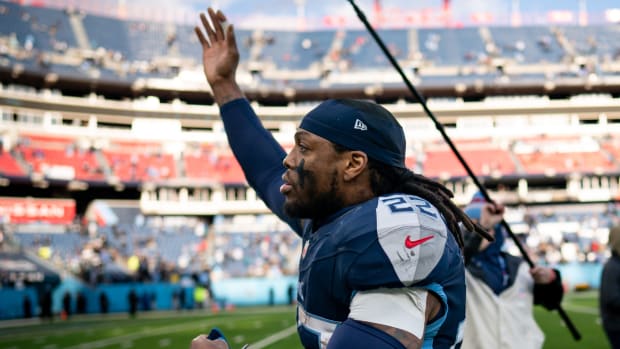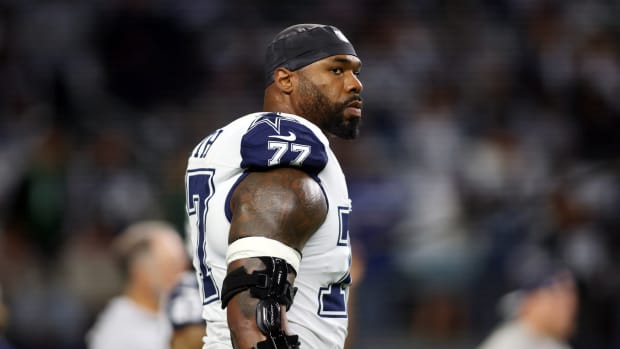Vrabel to Receivers: Let's Get Physical
NASHVILLE – On one of the first plays of a recent practice, wide receiver Treylon Burks ran full steam at cornerback Roger McCreary, dropped two hands in McCreary’s chest and delivered a light shove.
The maneuver sent McCreary back-pedaling for a step or two and provided Burks the separation needed (pictured) for him to haul in Ryan Tannehill's pass.
Would Burks have been flagged for offensive pass interference on the play? Maybe, maybe not.
But judging by the number of times Tennessee Titans receivers have gotten physical at the top of their routes this training camp – seeking to create added separation from defensive backs – it’s clear there’s a strategy in place.
Coach Mike Vrabel said when it comes to those types of battles, he’d prefer his receivers err on the side of aggression, even if it results in the occasional offensive pass-interference call. Vrabel went so far as to say he’d take full responsibility for the first offensive pass-interference penalty called on the Titans this season.
“Sometimes you can live in that world of not wanting to be overly physical because you’re going to get a penalty,” wide receivers coach Rob Moore said. “But at the end of the day, we tell these guys it’s about getting open. It’s about creating separation. Sometimes that’s the route you have to take to get that done. So we relish the fact that our head coach supports a physical style of play.”
The plan to get more physical as a receiving corps makes sense in a lot of ways.
Number one: It suits the personnel, as the group currently includes the likes of the Burks (6-2, 225), Nick Westbrook-Ikhine (6-2, 211), Racey McMath (6-3, 217), Dez Fitzpatrick (6-2, 208) and Cody Hollister (6-4, 220) among others.
The 6-foot, 195-pound Robert Woods isn’t quite in the same range, but he’s already earned a well-deserved reputation for playing larger than his size.
So why not take advantage of all those big bodies?
“We want our guys to use their physical skillsets,” offensive coordinator Todd Downing said. “We’ve got some big receivers. So let’s go use that physicality and that sturdiness at the top of the route, and then we can work on the techniques and the fundamentals to not blur the line between physicality and a foul.”
Added Burks: “I’d just say that’s my usual game. I just play physical because I’m big. I wouldn’t want to play like no small guy. No offense to them, but I’m not small. So I need to use my body and my strength to just play my game.”
Number two: Titans receivers may need to be extra physical in order to create separation this year.
That’s because there’s really not a bona fide deep threat among them. McMath looks to be making strides in that direction, but until he proves himself, there is not necessarily a receiver who can “take the top off” defenses on a consistent basis. A pressing defensive scheme and a more congested middle of the field may mean more battles with cornerbacks.
“That’s (our) job – get their hands off (us),” Woods said. “The defensive backs should know you set the tone early in the game.
“We’re not going to be allowing you to just hold us and put your hands on us. That’s our jobs as receivers – to get open, use our hands and use our bodies, play physical.”
Number three: Officials simply don’t call offensive pass interference with great frequency.
It was flagged 78 offensive times in 272 NFL regular-season games in 2021, compared to the 300 defensive pass-interference penalties that were whistled.
The Titans were called just twice for offensive pass interference in 2021, and once each in Vrabel’s first three seasons – 2018, 2019 and 2020.
While it’s praiseworthy that they have kept their violations low, could it also mean the team’s receivers might benefit by being a bit more aggressive – even if the downside is another one or two flags over the course of the season?
“If they’re going to grab and play physical against us, I want (our receivers) to play physical as well,” Vrabel said. “I think that we're going to try to err on the side of being aggressive, and then be able to dial back based on what (officials are) calling.”






